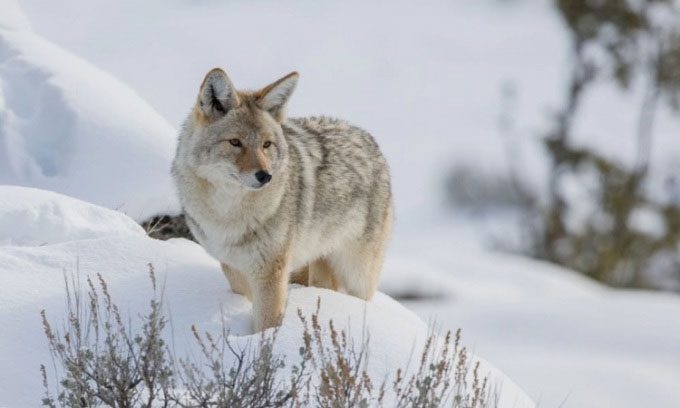Grassland wolves often seize the opportunity to scavenge on prey recently killed by mountain lions, such as deer or elk, but they may pay the ultimate price with their lives.
A new study published in the journal PNAS by scientists at the University of Oregon reveals that grassland wolves frequently steal or consume the carcasses of prey killed by mountain lions like deer and elk. However, this risky behavior often comes with significant danger. The research team recently discovered that mountain lions kill approximately 25% of the grassland wolves in the study area. The reason behind this could be competition for prey. The study indicates that elk, a common prey for mountain lions, makes up more than half of the grassland wolves’ diet.

Grassland wolf alert, listening for sounds in the snow. (Photo: National Geographic)
“Perhaps despite the risks, grassland wolves cannot resist the temptation of a freshly killed deer,” said Laura Prugh, a professor at the University of Washington. “They likely assess the risk based on the freshness of the signs left by large predators.”
Prugh noted the risk-taking behavior of grassland wolves while studying gray wolves in central Alaska. As snow levels in the study area sharply declined and grassland wolves began to consume prey more frequently, she wondered how medium-sized predators benefited from the presence of apex predators in the vicinity. She found that grassland wolves often lingered where gray wolves were present to take advantage of opportunities to scavenge, but this also increased their risk of being killed by gray wolves.
The research focused on grassland wolves because they are one of the largest populations of mesopredators in North America. They range from Alaska to Panama, and even further south. They are intelligent, reproduce well, and adapt easily, often willing to take risks to obtain food. In the study, scientists fitted collars on grassland wolves, mountain lions, black bears, and lynxes, then placed cameras in hunting areas to monitor the animals’ appearances and movements. The results showed that black bears typically avoid mountain lions and rarely venture into their hunting grounds. In contrast, lynxes showed little concern for mountain lions or their prey.
In the mountainous regions filled with sagebrush and juniper trees in Wyoming, the research team found that grassland wolves often steered clear of areas inhabited by mountain lions. Data from the radio-collared animals revealed that grassland wolves would avoid lingering around bushes and rocky outcrops where mountain lions often hide, unless they caught a whiff of food, according to researcher Mitchell Brunet. Nevertheless, the likelihood of grassland wolves being killed while feeding on mountain lion prey was also higher. However, they can survive if they steal prey in packs, increasing their vigilance and adapting more to life near humans.





















































